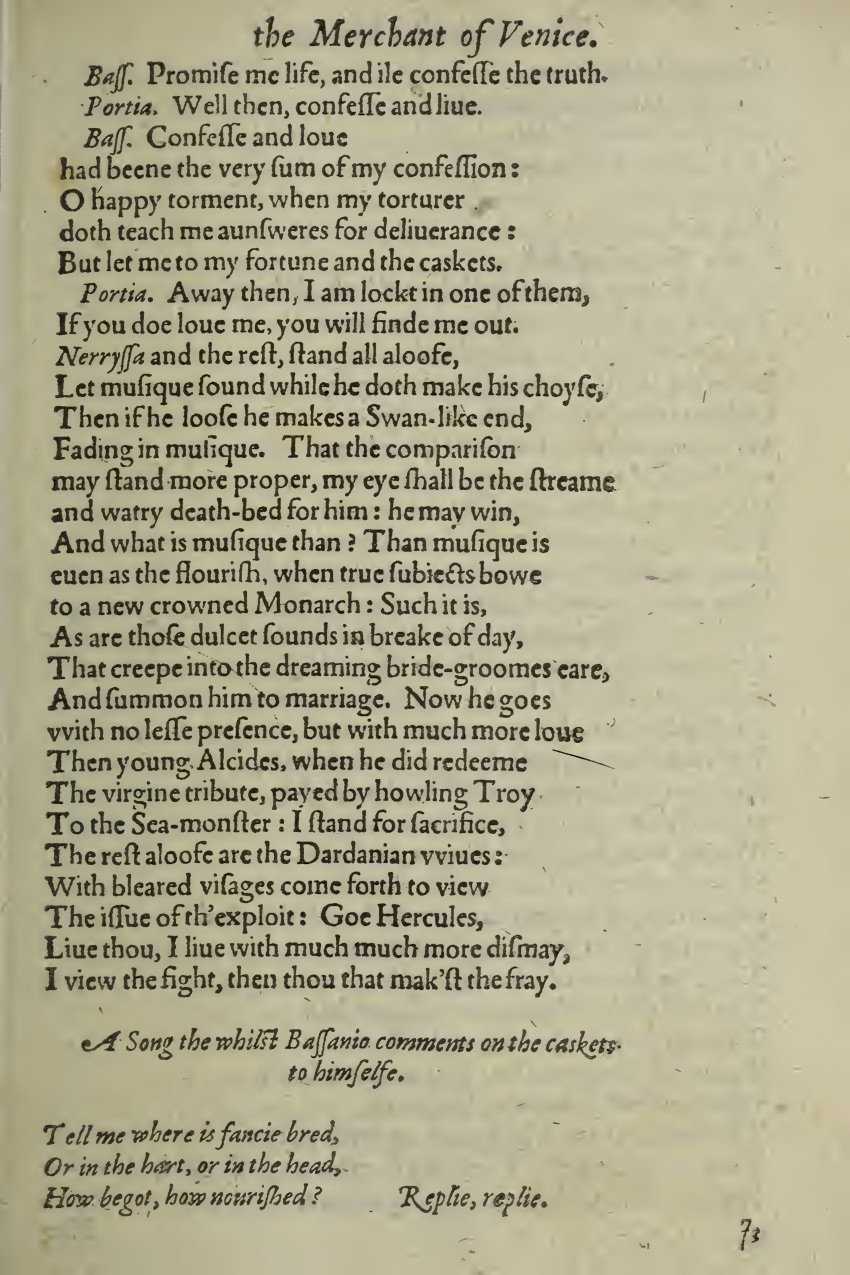Editorial Note
It is often said that William Shakespeare’s plays are meant to be heard, not just read. For an audience of high school or university students in an introductory Shakespeare class, we felt as though applying this philosophy could function as a way to make the text more accessible. Hence, we chose to emphasize the importance of the visual and auditory properties of Shakespeare’s writing through our translational adaptation of the below page of The Merchant of Venice. We accomplished this with varied textual changes to the Quarto, to differing affect:
- Spelling: Typeface in Early Modern printing presses dictated character conventions of the time. Contemporary readers often have trouble interpreting these unfamiliar letters, especially when reading aloud. Therefore, we changed the long s to the regular s and changed the u/v, vv/w, and y/i. Any words in which the spelling was changed significantly have been bolded and colored.
- Names: Just like in acting scripts, we wrote the characters full first name at the beginning of each of their lines to distinguish who is speaking. We also color-coded them.
- Spacing: We inserted spaces between the lines for increased visual distinction. This will aid students when acting or reading aloud the scene in class as they will be better able to find their spot on the page when glancing up and down.
- Aesthetic Consistency: We changed semicolons to periods where they are followed by capital letters and denote the end of a sentence. We only capitalized the letters after a period rather than at the beginning of each line of verse. We also chose to switch the words ‘then’ and ‘than’ given the context of the words within the text.
Translation Footnotes
Bassanio. Promise me life, and I’ll confess the truth.
Portia. Well then, confess and live.
Bassanio. Confess and love
had been the very sum of my confession.
O happy torment, when my torturer
doth teach me answers for deliverance:
But let me to my fortune and the caskets.
Portia. Away then, I am locked in one of them,
If you do love me, you will find me out.
Nerissa and the rest, stand all aloof1,
Let music sound while he doth make his choice.
(aside) Then if he lose he makes a Swan-like end,
Fading into music. That the comparison
may stand more proper, my eye shall be the stream
and watery death-bed for him. He may win,
And what is the music then? Then music is
even as the flourish2, when true subjects bow
to a new crowned Monarch. Such it is,
as are those dulcet3 sounds in the break of day,
that creep into the dreaming bride-groom’s ear,
and summon him to marriage. Now he goes
with no less presence4, but with much more love
than young Alcides5, when he did redeem
the virgin tribute, payed by howling Troy
to the Sea-monster6. I stand for sacrifice,
the rest aloof are the Dardanian wives7.
With blearéd visages come forth to view
the issue of th’exploit. Go Hercules!
live thou,8I live! With much much more dismay,
I view the fight, then thou that mak’st the fray9.
A song is sung while Bassanio comments on the caskets to himself.
Tell me where is the fancy10 bred,
Or in the heart, or in the head,
How begot, how nourished?
Reply, reply.11

Further Reading
Image credit: Rare Books & Manuscripts Department, Boston Public Library, copy G.176.16. The most excellent historie of the merchant of Venice. First Quarto. London: 1600.
Definition citations: Schmidt, Alexander, and Gregor Sarrazin. Shakespeare Lexicon and Quotation Dictionary, Vols. 1 and 2, Edited by Alexander Schmidt and Gregor Sarrazin, Dover Publications, 1971.
Citing this page: Shakespeare, William. The Merchant of Venice, E4r. London: 1600. Cacodemon Digital Shakespeare. Edited by Lauren DeSousa and Sydney Love. Source edition: Rare Books & Manuscripts Department, Boston Public Library (copy G.176.16). http://cacodemonshakespeare.com/comedies/merchant/e4r.
#slaythedayaway-sydneyandlauren
